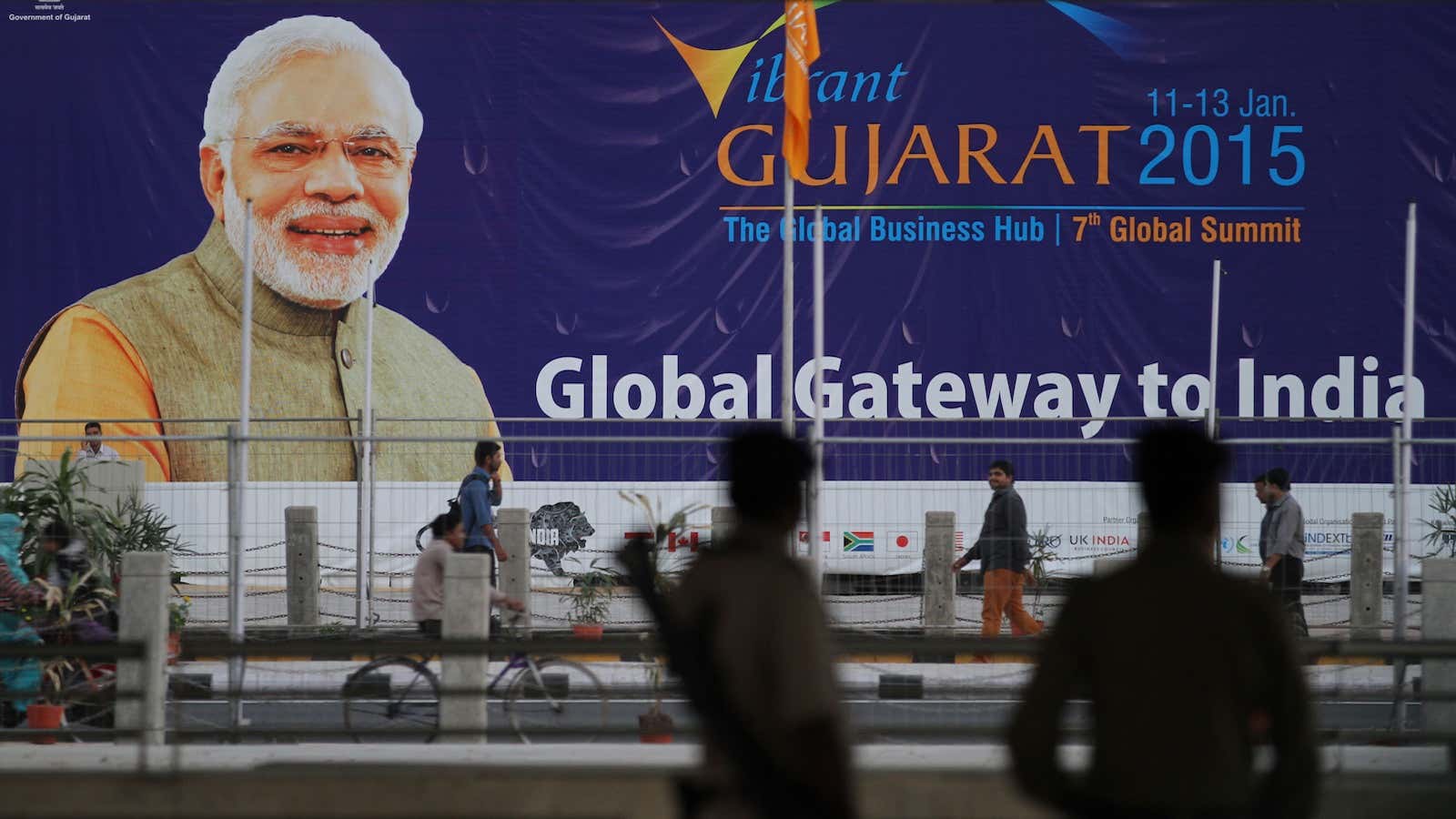GANDHINAGAR—In case you weren’t sufficiently enthusiastic about where India’s economy is heading, a quick Sunday stopover at the Vibrant Gujarat inaugural would have allayed your doubts.
Speaker after speaker—ranging from India’s richest man, Mukesh Ambani, to US secretary of state, John Kerry—had one thing to say: The country, under the new government, had changed tack and the future looked distinctly optimistic.
Narendra Modi, back at Gujarat’s marquee business jamboree for the first time after being elected India’s prime minister, was just as assured and told delegates from over a 100 countries that he wasn’t interested in “incremental” development.
“We are planning to take a quantum leap,” Modi said towards the end of his 40-minute-long speech.
The extended session in unabashed hopefulness began at around 10 am on Sunday, when Reliance Industries chairman Mukesh Ambani became one of the first business leaders to speak before a crowd of hundreds at Gujarat’s capital, Gandhinagar.
“India is marching forward with a clear vision to emerge as a major power,” Ambani said—and as if backing his analysis with investment, also announced that Reliance would pour Rs1,00,000 crore into Gujarat over the next 18 months.
What followed for the next few hours was more of the same; a celebration of Modi’s economic policies, also known as “Modinomics.”
Aditya Birla group chairman Kumar Mangalam Birla called it the “Gujarat government way”—a nod to Modi’s long reformist reign as the state’s chief minister.
Global mining heavyweight Rio Tinto’s chief Sam Walsh said that “there is an air of optimism in India,” and hoped that his company’s two stalled project—an iron ore mine in Odisha and a diamond mine in Madhya Pradesh—would finally take off. “Full of anticipation,” is also how he described himself.
Indian Institute of Management-Ahmedabad trained Ajaypal Singh Banga, the CEO of Mastercard and chairman of the US-India Business Council, was perhaps the more tempered of the speakers.
But even he couldn’t stop the enthusiasm from spilling over. “In the past year, this government has gotten off to a very, very good start,” Banga said, before listing out the usual suspects that bother American firms while doing business in India: Retrospective taxation, the goods and services tax and land acquisition.
Retrospective taxation, of course, has been a headache for multinationals, including Vodafone, which has had to deal with billion dollar tax bills in the last few years.
Vodafone’s CEO Vittorio Colao was at the head table—seated next to Ambani, along with more than 80 other political and business leaders—but didn’t take to the lectern.
By the time US secretary of state, John Kerry, rose to speak, there was little left to say about Modi, India, the growth trajectory or what the future of the economy might look like.
“Just about everything has been said, but not everybody has said it,” Kerry deftly observed, before himself moving to mention “the extraordinary new chapter of India that is being written today.”
Modi, for his part, presented a report-card-of-sorts to show what his government had managed to achieve since coming to power in May.
“In a very short span of seven months, we have been able to change the atmosphere of despair and uncertainty. Since day one, my government is working to revive the economy,” the prime minister said. “My government is committed to create a policy environment that is predictable, transparent and fair.”
“On the political front also, people of various states have supported us in the recent assembly elections,” he said. “This gives us the confidence that we are moving in right direction.”
And if the attendees of Vibrant Gujarat are any indication—described by Kerry as “95% of the people responsible for 95% of India’s GDP”—”Modinomics” is also moving in the right direction.
